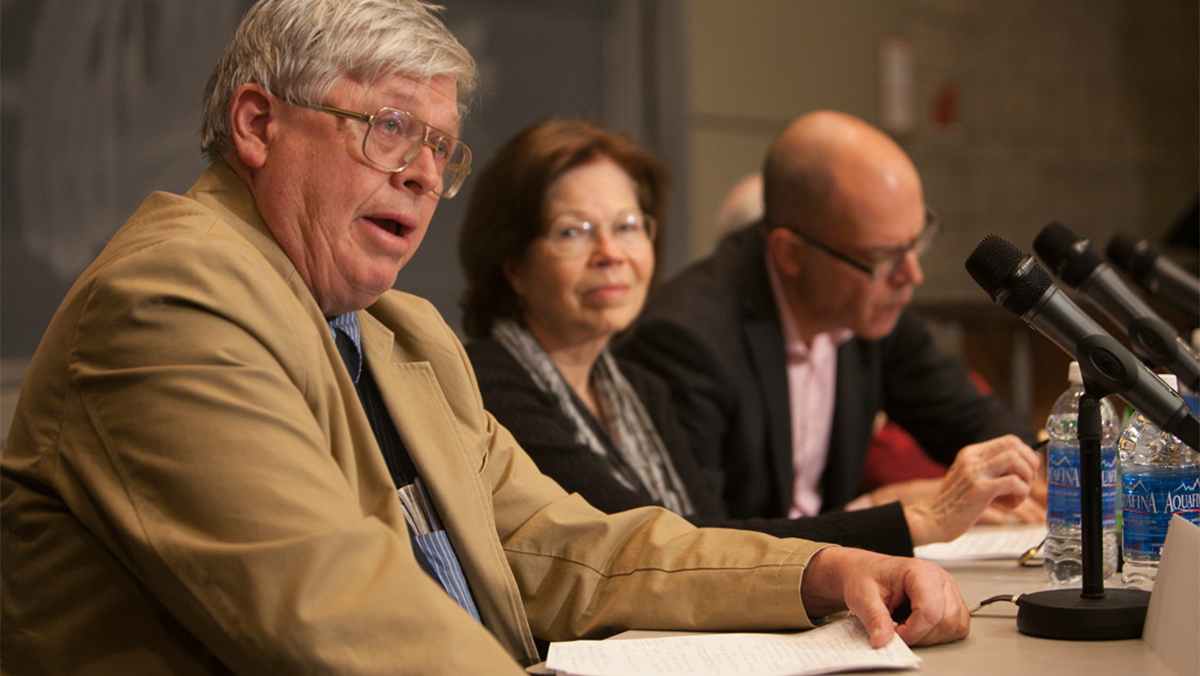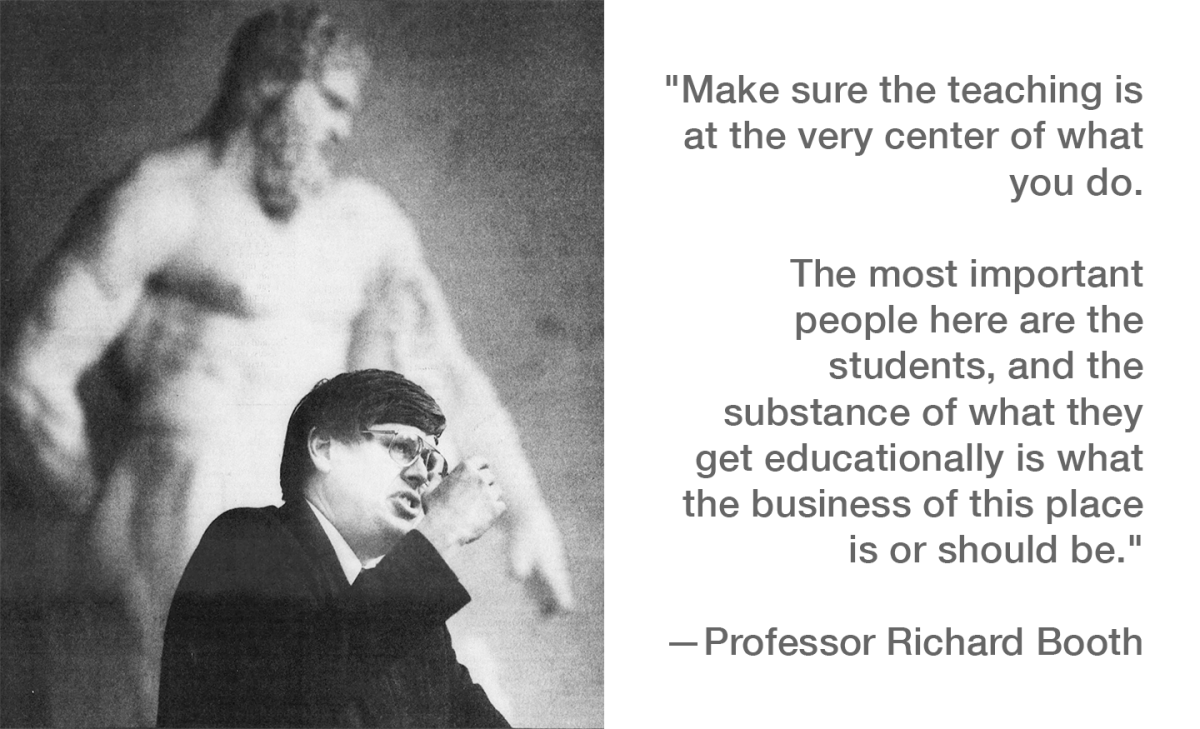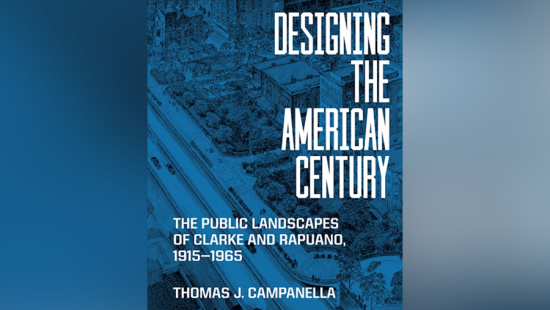CRP's Richard Booth Retires after Decades Devoted to Public Service and Teaching
Professor Booth offers a backward glance at a career dedicated to education and the environment and offers his incoming colleagues a few words of advice.

As Professor Richard Booth retired from the Department of City and Regional Planning (CRP) this summer, he took a moment to reflect on some of the pivotal moments that have benchmarked his rich 45-year career at the College of Architecture, Art, and Planning (AAP).
"I'm a teacher," Booth stated simply when we sat down to chat. "That's what I put the greatest emphasis on, and that's what I enjoyed the most."
Booth's direct approach served him well as he spent decades blazing a professional path that straddled law and education, both at Cornell and in the wider public sector. After completing his undergraduate degree at Amherst College in 1968, he briefly served as an English teacher and JV basketball coach at a small school in the southern Adirondacks before turning his focus to law study at George Washington University. Throughout his first year of study, he was unsure about pursuing law as a career, but when he saw a small poster for a new environmental law class at the start of his second year, "it was like a light went on," he recalled. "Environmental law, that's for me. And the light never went off."
Upon graduation in 1972, Booth immediately went to work for the New York State Adirondack Park Agency. As a staff lawyer, he was involved in drafting and implementing a regulatory program for land under the park's administration — a position that notably included foundational experiences in educating colleagues about complex legal issues.
"In the early days of the Adirondack Park Agency, as the new staff of professionals worked around the clock to draft land use controls for the park, young Dick Booth unexpectedly appeared," recalled William Kissel, the agency's general counsel at the time and Booth's first boss out of law school. "Often with a flying shock of hair and loose shirttail, Dick quickly earned the moniker Natty Bumppo as well as the full respect of the entire staff. His keen insight, sharp intellect, writing skills, and strong work ethic added considerably to the quality and integrity of the comprehensive Adirondack Park Land Use and Development Plan that was subsequently adopted by the legislature and that continues to protect the Adirondack Park some fifty years later."
Following this work, Booth served as a lawyer for the New York State Department of Environmental Conservation from 1975 to 1977, rising to the position of assistant counsel dealing with land use affairs. Having recently turned 30 and interested in exploring other opportunities, however, he came across a job announcement for a position at AAP. Though he didn't have the requisite Ph.D., he wrote a letter outlining his extensive experience in the areas of environmental and land use law and he was quickly contacted by former AAP Dean Burnham Kelly, who encouraged him to "get your butt down here as fast as you can and deliver a lecture that people can listen to." Within a week, Booth was interviewing in Ithaca and, just another week following, he had a job offer in hand. "For a while, I actually thought academic searches were short!" he confessed with a chuckle, experience having since corrected this impression.
As he taught classes across topics of planning and law, Booth's position neatly allowed him to continue to pursue his interest in sharing legal discussions beyond practicing legal professionals. "As I've said to students over decades now, if you don't pay attention to the law, you cannot contribute substantively to any major discussion because legal issues permeate every major issue. You're not going to do away with the lawyers, but you have to understand how the law shapes the discussion."

Booth achieved tenure in 1983, and in 1985 he was tasked with leading CRP's undergraduate Urban and Regional Studies degree program. "I always thought that was a very exciting part of what I did," he acknowledged. "I think it was an absolute necessity that we created an undergraduate program in CRP."
His influence at AAP spread an even wider net, and colleagues such as CRP Professor Thomas Campanella found in him a mentor and friend, "one of the most principled and decent people I've ever known," Campanella noted. "He is a man of insatiable curiosity and reads more than anyone I know — about the environment, history, and human affairs. He is also a person of deep and quiet wisdom, who in faculty meetings would wait until all the clamor and emotion was spent before offering his view — in a sane and measured manner that cut like a laser through the fog."
Booth's piercingly observant nature was a particularly valuable tool as, concurrent with his work as an instructor, his commitment to public service didn't waver. He was elected to multiple terms on the City of Ithaca Common Council and the Tompkins County Legislature, followed by gubernatorial appointments from November 2007 through June 2016 to serve as a member of the New York State Adirondack Park Agency. While work for the APA was often contentious, Booth built a reputation during his eight and a half years as a strong environmental champion.
As a new slate of incoming faculty join CRP, Booth offered a few words of advice: "I'm not naive and I think many people would disagree with this, but make sure the teaching is at the very center of what you do. The most important people here are the students, and the substance of what they get educationally is what the business of this place is or should be primarily. And so, whatever you do, pay the most attention to that."
It's a focus that has motivated Booth's own work across the decades. "That's what I've done and that's what I've enjoyed doing," he reiterated. "Along with having a family, that's taken up 45 years."
Stay connected! Follow @cornellaap on Instagram, Facebook, Twitter, and LinkedIn; and subscribe to our AAP bi-weekly newsletter.







